‘Royal peace talks’ and ‘Sinner takes it all’













Stay informed and up-to-date with the latest news from around the world. Our comprehensive news coverage brings you the most relevant and impactful stories in politics, business, technology, entertainment, and more.


























Remarks by Chinese embassy spokesperson in New Delhi come ahead of Indian foreign minister’s visit to China – the first since 2020 clashes.
The succession of the Tibetan spiritual leader the Dalai Lama is a “thorn” in China-India relations, says the Chinese embassy in New Delhi.
The remarks on Sunday came ahead of the first visit by India’s foreign minister to China since the deadly border clashes between the South Asian powers in 2020.
“In reality, [the] Xizang-related issue is a thorn in China-India relations and has become a burden for India,” Yu Jing, a Chinese embassy spokesperson, posted on X, referring to “Xizang”, the Chinese name for Tibet.
Ahead of celebrations this month for his 90th birthday that were attended by senior Indian ministers, the Dalai Lama angered China again by saying it had no role in his succession.
Tibetans believe the soul of any senior Buddhist monk is reincarnated after his death, but China says the succession will also have to be approved by its leaders.
The Dalai Lama has been living in exile in India since 1959 following a failed uprising against Chinese rule in Tibet.
Indian foreign relations experts say his presence gives New Delhi leverage against China. India is also home to about 70,000 Tibetans and a Tibetan government-in-exile.
In her post, spokesperson Yu, without naming anyone, said some people from strategic and academic communities in India had made “improper remarks” on the reincarnation of the Dalai Lama.
“As professionals in foreign affairs, they should be fully cognizant of the sensitivity of issues related to Xizang,” Yu said. “The reincarnation and succession of the Dalai Lama is inherently an internal affair of China.”
🔹It has been noted some people from strategic and academic communities, including former officials, have made some improper remarks on the reincarnation of Dalai Lama, contrary to Indian government’s public stance.
🔹As professionals in foreign affairs, they should be fully… pic.twitter.com/HlG2IdvW1P— Yu Jing (@ChinaSpox_India) July 13, 2025
Indian Parliamentary and Minority Affairs Minister Kiren Rijiju, who sat next to the Dalai Lama during his 90th birthday festivities a week ago, has said that as a practising Buddhist, he believes only the spiritual leader and his office have the authority to decide on his reincarnation.
India’s Foreign Ministry said on July 4, two days before the Dalai Lama’s birthday, that New Delhi does not take any position or speak on matters concerning beliefs and practices of faith and religion.
India’s External Affairs Minister S Jaishankar will be attending a regional security meeting under the Shanghai Cooperation Organisation in Tianjin in northern China on July 15 and hold bilateral meetings on the sidelines.
This will be one of the highest-level visits between India and China since their relations nosedived after a deadly border clash in 2020 that killed at least 20 Indian and four Chinese soldiers.
President Ramaphosa’s move follows accusations that Senzo Mchunu interfered with sensitive investigations.
South African President Cyril Ramaphosa has suspended his police minister “with immediate effect” over corruption allegations, a week after a provincial police chief made the accusations.
In a country facing endemic corruption, Sunday’s announcement was highly anticipated after a week of speculation over the fate of Senzo Mchunu, who became police minister a year ago after the general elections.
Mchunu, 67, who local media had suggested as a potential candidate from the centrist faction of the African National Congress (ANC) to succeed Ramaphosa, has rejected the allegations as “insinuations made without evidence or due processes”.
Ramaphosa also established a judicial commission of inquiry, with reports expected after three and six months.
“The commission will investigate the role of current or former senior officials in certain institutions who may have aided or abetted the alleged criminal activity, failed to act on credible intelligence or internal warnings, or benefitted financially or politically from a syndicate’s operations,” Ramaphosa said during a televised address.
KwaZulu-Natal Provincial Commissioner Lieutenant-General Nhlanhla Mkhwanazi alleged on July 6 that Mchunu received payments from a corruption suspect.
Mkhwanazi also accused him of having played a role in dismantling a team investigating killings that shielded politically connected people.
The commissioner, speaking at a media briefing flanked by armed security forces, some with their faces masked, said he had opened a criminal investigation into the minister. He also accused other officials of obstructing police work against organised crime.
Mkhwanazi himself is under investigation for allegations of corruption in the awarding of a bulletproof vest contract, the weekly Sunday Times reported.
Firoz Cachalia, a law professor and member of the governing ANC, has been appointed as the interim police minister.
South Africa ranks 82nd in the world, according to the corruption perception index of the NGO Transparency International.
Most opposition parties on Sunday criticised Ramaphosa for putting Mchunu on a leave of absence instead of firing him.
“This was an opportunity to take South Africans into confidence, and to deal with these issues decisively. Instead, he calls for a commission of inquiry and expects South Africans to be patient when people are dying on a daily basis,” said Nhlamulo Ndhlela, the spokesperson of the opposition MK Party.
England beat Wales 6-1 with six different players on the scoresheet to set up a Women’s Euro 2025 quarter-final with Sweden.
Source link
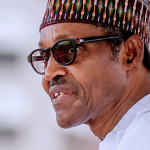
In December 2014, an incumbent president lost a re-election bid for the first time in Nigeria’s history.
It was a time characterised by widespread anguish and anger at how insecure the Nigerian life had become. Boko Haram, the extremist insurgent group fighting to establish what it calls an Islamic State, had intensified its violence, killing hundreds of thousands, displacing millions more, and abducting hundreds of teenage girls from school. Bombs were also being detonated in major cities at an alarming rate. For Nigerians, the incumbent President Goodluck Jonathan simply had to go. And so Muhammadu Buhari was voted in with unflinching hope that things would get better. That hope quickly turned into disillusionment and, in some cases, anger as things began to take a different turn than was hoped for.
Today, July 13, the former president, Muhammadu Buhari, passed away at 82, signalling the conclusion of a significant political chapter. As tributes from dignitaries continue to emerge and headlines reflect on his ascent and legacy, HumAngle analyses the impact of his presidency on the lives of Nigerians beyond the halls of power, in displacement camps, remote villages, and troubled areas.
During his time in office from 2015 to 2023, Nigeria faced increasing violence on various fronts: the Boko Haram insurgency in the North East, a resurgence of militants in the Niger Delta, and the rising threat of terrorism and conflicts between farmers and herders in the North West and Middle Belt.
Buhari’s administration initiated multiple military operations, including Operation Lafiya Dole, Operation Python Dance, Operation Safe Corridor, etc., yielding mixed outcomes and levels of responsibility. While some campaigns succeeded in pushing back armed groups, others faced criticism due to evidence of excessive force, extrajudicial killings, and displacements within communities. Non-kinetic counter-insurgency operations such as the Operation Safe Corridor, which was launched in 2016, also came under heavy criticism. Though the programme was designed for Boko Haram members or members of similar insurgent groups in the northeastern region to safely defect from the terror groups and return to society, HumAngle found that civilians were finding their way into these programmes, due to mass arbitrary arrests prompted by profiling and unfounded allegations. The International Crisis Group also found that, beyond innocent civilians being forced to undergo the programme, other kinds of irregularities were going on.
“The program has also been something of a catch-all for a wide range of other individuals, including minors suspected of being child soldiers, a few high-level jihadists and alleged insurgents whom the government tried and failed to prosecute and who say they have been moved into the program against their will,” the group said in a 2021 report. At the time, more than 800 people had graduated from the programme.
The programme also did not – and still does not – have space for women, and HumAngle reported the repercussions of this.
During Buhari’s reign, terrorists were also forced out of major towns but became more entrenched in rural communities. The former president launched aggressive military campaigns against them, reclaiming villages and cities. Boko Haram retreated into hard-to-reach areas with weaker government presence, operating in remote parts of Borno, Yobe, and Adamawa States. In these areas, the group imposed strict rules, conscripted fighters, and punished dissenters, often with brutal force.
A HumAngle geospatial investigation also showed how insurgency wrecked hundreds of towns and villages in Borno state. Many of the rural settlements were overrun after Boko Haram lost urban ground under Buhari’s watch.
Even with significant investment in security, a large portion of rural Nigeria remains ungoverned to date. As the former president failed to curb the forest exploits of Boko Haram, the terror group expanded control over ungoverned spaces, particularly in the North Central and North East regions. In Niger State alone, terrorists took over communities in Shiroro, Rafi, Paikoro, and Munya LGAs, uprooting thousands and launching multiple attacks. The lack of accessible roads and communication infrastructure made rapid response nearly impossible, allowing the terrorists to operate with impunity.
HumAngle found that, under Buhari, Nigeria lost many forest areas to terrorists, especially in Niger state. In areas like Galadima Kogo, terrorists imposed taxes, enforced laws, and ran parallel administrations. The withdrawal of soldiers from key bases emboldened the terrorists. This shift from urban insurgency to rural domination underscores the failure to secure Nigeria’s vast ungoverned spaces. Analysts who conducted a study on alternative sovereignties in Nigeria confirmed that Boko Haram and other non-state actors exploited the governance gaps under Buhari’s administration to expand their influence, threatening national security.
For individuals beyond Abuja and Lagos, Buhari’s governance was characterised more by the state’s tangible influence than by formal policy declarations.
In Borno and Yobe, civilians faced military checkpoints and insurgent violence. School abductions like the Dapchi abduction and many others were recorded..
In Zamfara and Katsina, the president’s silence on mass abductions often resounded more than his condemnations. In Rivers and Bayelsa, the Amnesty Programme faltered, and pipeline protection frequently took precedence over human security.
While some lauded his stance against corruption, numerous victims of violence and injustice during Buhari’s time in office did not receive restitution or formal acknowledgement of the wrongdoing. The former President remained silent during his tenure, as significant human rights violations were recorded. The investigations into military abuses, massacres, forced disappearances, and electoral violence either progressed slowly or ultimately came to an end.
Police brutality was a major problem during his tenure, leading to the EndSARS protests that swept through the entire nation in October 2020, with Lagos and Abuja being the major sites. The peaceful protests sought to demand an end to extrajudicial killings and extortion inflicted by the now-defunct Special Anti-Robbery Squad (SARS). For two weeks, Nigerians trooped into the streets with placards and speakers, memorialising the victims of police brutality and demanding an end to the menace. The protests came to a painful end on the night of October 20, when the Nigerian military arrived at the Lekki Toll Gate in Lagos and fired live rounds into the crowd of unarmed civilians as they sat on the floor, singing the national anthem. It is now known as the Lekki Massacre. Though the government denied that there was any violence, much less a massacre, a judicial panel of inquiry set up to investigate the incident confirmed that there had, in fact, been a massacre.
No arrests were made, and activitsts believe some protesters arrested then may still be in detention to date.
Five years before this, on December 13 and 14, the Nigerian military opened fire on a religious procession in Zaria, containing members of the Islamic Movement of Nigeria (IMN), killing many and leaving others wounded. The incident is now known as the Zaria Massacre. HumAngle spoke to families of some of the people who were killed and children who were brutalised during this time.
Though these massacres have all been well documented, there has been little to no accountability for the aggressors or compensation for victims and their families.
“My life became useless, losing three children and my husband to soldiers for committing no offence…I have never gone three days without my husband and all my children. This has affected my last-born, who is now in a psychiatric facility,” Sherifat Yakubu, 60, told HumAngle.
“I feel a great wrench of sadness anytime I remember the injustice against my people, and I don’t think the authorities are ready to dispense justice,” another victim told HumAngle in 2022, highlighting the gap and lack of trust in the system created by the absence of any accountability after the incident.
Beyond the headlines, Buhari played a crucial role in establishing a framework for centralised security authority. Choices regarding law enforcement, military presence, and national security circumvented local leaders and established institutions, exacerbating conflicts between the central government and regional entities. This centralisation continues to influence Nigeria’s democratic journey, disconnecting many experiences from those who are supposed to safeguard them.
Buhari rode into power on a widely hailed anti-corruption campaign, a promise honoured with the swift implementation of the already-proposed Single Treasury Account (TSA). By 2017, the programme, which consolidated up to 17,000 accounts, had saved the country up to ₦5.244 trillion. Buhari’s Presidential Initiative on Continuous Audit (PICA) eliminated over ₦54,000 ghost jobs, and Nigeria reclaimed ₦32 billion in assets in 2019. Under the same administration, Nigeria got back $300 million in Swiss-held Abacha loot.
From 2.5 million MT in 2015, rice production rose to four million MT in 2017. In an effort to deter rice, poultry and fertiliser smuggling, the former president closed Nigeria’s land borders on August 20, 2019, a move believed to have bolstered local food production significantly. His government’s Presidential Fertiliser Initiative also produced over 60 million 50 kg bags, saving about $200 million in forex and ₦60 million yearly.
Infrastructural achievements under the late president include the completion of the Abuja-Kaduna, Itakpe-Warri and Lagos-Ibadan railway projects, as well as the extension of the Lagos-Ibadan-Port Harcourt rail line. Notably, his government completed the Second Niger Bridge and the Lekki Deep Seaport.
Fatalities from Boko Haram reduced by 92 per cent, from 2,131 deaths in 2015 to 178 in 2021. Under the same administration, over a million Internally Displaced Persons (IDPs) were resettled, and 13,000+ hostages, including some Chibok and Dapchi schoolgirls, regained freedom. The same government acquired 38 new aircraft and Nigeria’s first military satellite (Delsat-1).
In 2021, the Buhari government signed the Petroleum Industry Act (PIA), restructuring the Nigerian National Petroleum Commission (NNPC) into a commercial entity and setting the stage for significant transformation in the country’s oil and gas sector.
The passing of a president demands more than mere remembrance or the crafting of political narratives. It should create an opportunity for national reflection. As Nigeria faces fresh challenges of insecurity, displacement, and regional strife, Buhari’s legacy presents both insights and cautions.
As official tributes accumulate, Nigerians reflect not only on what Buhari accomplished but also on what remains incomplete.
Top seed Sinner defeats Alcaraz 4-6, 6-4, 6-4, 6-4 in the final to win his first Wimbledon and fourth Grand Slam title.
Wimbledon, United Kingdom – It has taken Jannik Sinner just five weeks to exact revenge against Carlos Alcaraz in their blockbuster tennis rivalry and win the men’s singles final at Wimbledon 2025.
The top-seeded Italian overcame the emotional and physical toll of losing the French Open final to Alcaraz by defeating the Spaniard 4-6, 6-4, 6-4, 6-4 at the All England Lawn Tennis and Croquet Club in London on Sunday.
Sinner turned the tables on the defending champion by overcoming a loss in the first set – and some early nerves – to win his fourth Grand Slam trophy and first on the famous Centre Court at SW19.
Two-time champion Alcaraz began the final with a strong service game, pouncing on Sinner’s nervous start in his first appearance in a Wimbledon final. The 22-year-old went on to break the world number one’s serve and wrap up the first set in 45 minutes, deploying a serve-and-volley style strategy to win the crucial points.
Sinner dug deep in the second set and was back to his ice-cool self as he applied the brakes on Alcaraz’s attempt for a three-peat of titles at Wimbledon.
The quality of tennis went up a notch as the 23-year-old matched Alcaraz shot for shot and left the crowd gasping at every other point.
Sinner didn’t waste much time in breaking back against the defending champion by deploying an excellent service game to keep Alcaraz at bay, altering his speed and delivery to ensure his opponent scurried for every point. He was soon on level terms.
The third set was, by far, the highlight of the final as both players threw everything at each other with sensational court coverage, scintillating aces, sublime drop shots and even a “tweener”.
It was end-to-end action up until the eighth game, when Alcaraz slipped up by the barest of margins but ended up having his serve broken. Sinner wasted no time to bring out his ruthless streak and finish off Alcaraz’s chances in the set.
Leading the final two sets to one, Sinner stepped on the gas in the fourth and ensured there would be no late Alcaraz comeback as so memorably occurred in the French Open final on June 8.
He broke Alcaraz in the third game, and the stoic Italian showed a glimpse of emotion as he looked towards his team in the stands.
Crowd favourite Alcaraz had most of the capacity crowd on Centre Court behind him, including King Felipe of Spain, but it was not enough to help him stay in the final for one more set as Sinner sealed the trophy with a faultless service game.

With joy and disbelief etched on his face, and with the match now over, Sinner raised both arms with a jolt before squatting down on the court to pat the grass with the other hand, all the while hiding the emotions on his face.
Not only did he avenge his French Open final loss with a fourth major trophy, Sinner also moved to within one Grand Slam title of his great contemporary Alcaraz.
The two-time Australian Open champion has become the first man from Italy to win the Wimbledon title, a feat he described as akin to “a dream of a dream”.
“I had never thought of being in this position [to win Wimbledon] growing up so far away from here,” an unusually emotional Sinner said on court after the match.
“I had a very tough loss in Paris, but I tried to understand what I did wrong and kept working [hard].”
Sinner has now won Grand Slam titles on two of the three surfaces and said he was happy to have held his nerve while serving for the championship in the fourth set. Alcaraz, ever the gracious opponent in defeat as in victory, kept up his applause for Sinner even after returning to his chair after losing the match. But he said it was a difficult loss.
“I love playing here and I’m going to be back for sure,” the Spaniard told his fans on Centre Court.
Both players walked off to a loud round of applause after providing yet another enthralling glimpse into another “golden era” of tennis.
Sinner and Alcaraz have won all seven Grand Slam finals since the beginning of 2024, and it will only be a matter of eight weeks until tennis fans can hope to see the next instalment of their flourishing rivalry at the last Grand Slam of the year, the US Open.

Israeli columnist Gideon Levy says Israel has ‘no clue’ about dealing with Gaza, besides ongoing death and destruction.
Israeli columnist Gideon Levy tells host Steve Clemons that almost all Israelis believe their country “has the right to do whatever it wants”. This includes war crimes and plans to create concentration camps for Palestinians in Gaza, in preparation for expulsion.
Levy argues that it makes no difference if a Republican or Democratic administration were in power in the United States or if Prime Minister Benjamin Netanyahu or a different politician were in power in Israel.
“The same war might have taken place, and the same crimes of war would have been committed,” he said.
Authorities send troops to de-escalate the situation after fighting breaks out between Bedouins and Druze.
Fighting between Bedouin tribes and local fighters in the predominantly Druze city of Sweida in southern Syria has killed several people.
Sunday’s clashes are the first outbreak of deadly violence in the area since fighting between members of the Druze community and security forces killed dozens of people in April and May.
The Syrian Observatory for Human Rights, a Britain-based monitor, said at least eight people were killed, six Druze and two Bedouin.
Citing medical sources, local outlet Sweida 24 gave a preliminary toll of seven people killed, “including a child, and about 32 others wounded as a result of armed clashes and mutual shelling in the Maqus neighbourhood”, east of Sweida city.
It also reported the closure of the Damascus-Sweida highway because of the violence.
A Syrian government source, speaking anonymously to AFP news agency, said authorities sent soldiers to de-escalate the situation.
Sweida Governor Mustapha al-Bakour called on people to “exercise self-restraint and respond to national calls for reform”.
Syria’s Druze population numbers about 700,000, with Sweida home to the sect’s largest community.
Bedouin and Druze factions have a longstanding feud in Sweida, with violence occasionally erupting.
Since the overthrow of longtime Syrian ruler Bashar al-Assad in December, concerns have been raised over the rights and safety of minorities under the new authorities, who have also struggled to re-establish security more broadly.
Clashes between troops and Druze fighters in April and May killed dozens of people, with local leaders and religious figures signing agreements to contain the escalation and better integrate Druze fighters into the new government.
BBC News, Essex

 Frazer Brooks
Frazer BrooksAn aircraft has crashed at London Southend Airport, police have confirmed.
Essex Police said it was alerted to a 12-metre plane on fire at the site in Southend-on-Sea shortly before 16:00 BST on Sunday.
The East of England Ambulance Service said four crews were at the scene including a rapid response vehicle, a hazardous area response vehicle and a senior paramedic.
The Labour MP for Southend West and Leigh, David Burton-Sampson, said on X: “My thoughts are with everyone involved.”

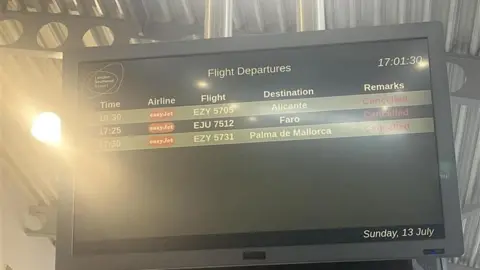 Contributed
ContributedA spokesperson for Essex Police said: “We are working with all emergency services at the scene now and that work will be ongoing for several hours.
“We would please ask the public to avoid this area where possible while this work continues.”
Essex County Fire and Rescue Service said it was called to the incident at 15:58 and has asked people to avoid the area if possible.
A spokesperson said: “Crews from Southend (two), Rayleigh Weir and Basildon (two), along with off-road vehicles from Billericay and Chelmsford attended.
“We are continuing to work at the scene with our emergency services and aviation partners.”

 Nick Hull/BBC
Nick Hull/BBCPolice said, as a precaution, officers have evacuated the Rochford Hundred Golf Club and Westcliff Rugby Club due to its proximity to the incident.
An eyewitnesses from Westcliff Rugby Club said a presentation event was happening at the time of the incident.
Matt Dent, Southend City Council’s cabinet member for business, culture, music and tourism, said on X: “I am aware of the live serious incident ongoing at London Southend Airport.
“At present all I know is that a small plane has crashed at the airport. My thoughts are with all those involved, and with the emergency services currently responding to the incident.”
More details emerge on June assassination attempt on President Masoud Pezeshkian and other officials by Israel.
Iran’s President Masoud Pezeshkian suffered minor injuries in an Israeli air strike on a meeting of the Supreme National Security Council in Tehran on June 15, a senior Iranian official said.
The assassination attempt targeted the heads of the three branches of government in an effort to overthrow it, said the official, speaking on condition of anonymity.
“This attempt will not pass without Israel paying a price,” he told Al Jazeera.
The strike was carried out shortly before noon during a meeting attended by the heads of the executive, legislative, and judicial branches of the government along with other senior officials.
The semiofficial Fars news agency also reported new details on the assassination attempt during Israel’s 12-day war with Iran, which was first announced by the Iranian president in an interview released on Monday.
The session was taking place in the lower level of a government facility in western Tehran when the attack started, Fars reported. The building’s entrances and exits were hit by six missiles to block escape routes and cut off air flow.
Electricity was severed following the explosions, but Iranian officials managed to escape through a pre-designated emergency hatch, including the president, who is said to have sustained minor leg injuries while evacuating.
The news agency said authorities launched an investigation into the possible presence of Israeli spies given the accuracy of the intelligence the “enemy” possessed.
Last week, Pezeshkian said in an interview with US media figure Tucker Carlson that Israel attempted to assassinate him. “They did try, yes … but they failed,” he said.
“It was not the United States that was behind the attempt on my life. It was Israel. I was in a meeting… They tried to bombard the area in which we were holding that meeting.”
The comments come less than a month after Israel launched its unprecedented June 13 bombing campaign against Iran, killing top military commanders and nuclear scientists.
The Israeli attacks took place two days before Tehran and Washington were set to meet for a new round of nuclear talks, stalling negotiations aimed at reaching a deal over Iran’s atomic programme.
At least 1,060 people were killed in Iran during the conflict, according to Iran’s Foundation of Martyrs and Veterans Affairs.
The Israeli attacks drew waves of retaliatory drone and missile fire, killing 28 people in Israel, according to authorities.
Iran targeted Israeli military and intelligence headquarters with ballistic missiles and drones before the US brokered a ceasefire.
“Universities worldwide, under the guise of research neutrality, continue to profit from an [Israeli] economy now operating in genocidal mode. Indeed, they are structurally dependent on settler-colonial collaborations and funding.”
This is what United Nations Special Rapporteur Francesca Albanese wrote in her latest report “From economy of occupation to economy of genocide”, which documents the financial tentacles of Israel’s ongoing genocide in Gaza and beyond. Its release prompted the United States’ governing regime to issue sanctions against Albanese in a move the Italian legal scholar rightly described as “obscene” and “mafia intimidation tactics”.
The report reveals how universities not only invest their endowments in corporations linked to Israel’s war machine, but also engage in directly or support research initiatives that contribute to it. It is not only a damning indictment of the complicity of academia in genocide, but also a warning to university administrations and academics that they hold legal responsibility.
In Israel, Albanese observes, traditional humanities disciplines such as law, archaeology, and Middle Eastern studies essentially launder the history of the Nakba, reframing it through colonial narratives that erase Palestinian histories and legitimise an apartheid state that has transitioned into what she describes as a “genocidal machine”. Likewise, STEM disciplines engage in open collaborations with military industrial corporations, such as Elbit Systems, Israel Aerospace Industries, IBM, and Lockheed Martin, to facilitate their research and development.
In the United States, Albanese writes, research is funded by the Israeli Defence Ministry and conducted by the Massachusetts Institute of Technology with various military applications, including drone swarm control.
In the United Kingdom, she highlights, the University of Edinburgh has 2.5 percent of its endowment invested in companies that participate in the Israeli military industrial complex. It also has partnerships with Ben-Gurion University and with companies supporting Israeli military operations.
While Canadian institutions do not appear in Albanese’s report, they very easily could and, indeed, we argue, should.
Canada’s flagship school, the University of Toronto (UofT), where one of us teaches and another is an alumnus, is a particularly salient example.
Over the past 12 years, the UofT’s entanglements with Israeli institutions have snowballed, stretching across fields from the humanities to cybersecurity. They also involve Zionist donors (both individuals and groups), many of whom have ties with complicit corporations and Israeli institutions, and have actively interfered with university hiring practices to an extent that has drawn censure from the Canadian Association of University Teachers.
This phenomenon must be understood in the context of the defunding of public higher education, which forces universities to seek private sources of funding and opens up universities to donor interference.
After calls for cutting such ties intensified amid the genocide, the UofT doubled down on them over the past year, advertising artificial intelligence-related partnerships with Technion University in Haifa, joint calls for proposals with various Israeli universities, and student exchange programmes in Israel.
The UofT also continues to fundraise for its “Archaeology of Israel Trust”, which was set up to make a “significant contribution to the archaeology of Israel” – a discipline that has historically focused on legitimising the Israeli dispossession of the Palestinian people. It also inaugurated a new lab for the study of global anti-Semitism, which is funded by the University of Toronto-Hebrew University of Jerusalem Research & Innovation Alliance.
In addition to institutional partnerships, UofT’s Asset Management Corporation (UTAM), which manages the university’s endowment, has direct connections with many companies that are, as per Albanese’s report, complicit in the genocide in Palestine, including Airbnb, Alphabet Inc, Booking Holdings, Caterpillar, Elbit Systems, Leonardo, Lockheed Martin, and Palantir Technologies.
A 2024 report found that 55 of these companies operate “in the military-affiliated defence, arms, and aerospace sectors” and at least 12 of UTAM’s 44 contracted investment managers have made investments totalling at least $3.95 billion Canadian dollars ($2.88bn) in 11 companies listed by the United Nations High Commissioner for Human Rights (OHCHR) as supporters of the construction and expansion of illegal settlements in the Palestinian territories.
Furthermore, 17 of UTAM’s 44 contracted investment managers are responsible for managing around $15.79 billion Canadian dollars ($11.53bn) in assets invested in 34 companies identified by The American Friends Service Committee as benefiting from the ongoing genocide in Gaza.
UofT is not unique among Canadian universities in this regard. According to a report on university divestment, Western University, too, promotes ongoing partnerships with Ben-Gurion University and invests more than $16m Canadian dollars ($11.6m) in military contractors and nearly $50 million Canadian dollars ($36.5) in companies directly complicit in the occupation of Palestine and the genocide of Palestinians. The list of complicit companies again includes Lockheed Martin, as well others listed by Albanese like Chevron, Booking Holdings, Airbnb, and Microsoft.
McGill University, another top Canadian university, has also invested in Lockheed Martin, as well as notable military industrial companies like Airbus, BAE Systems, Safran, and Thales, which have also been accused of providing weapons and components to Israel.
In the context of the ongoing genocide, students, staff, and faculty at such complicit universities – including at each of our respective institutions – have been demanding that their universities boycott and divest from Israel and companies profiting from its warfare.
They are not only explicitly in the right according to international law, but are actually articulating the basic legal responsibility and requirement borne by all corporate entities.
And yet, for raising this demand, they have been subjected to all manner of discipline and punishment.
What Albanese’s report lays bare is that university administrators – like other corporate executives – are subject to and, frankly, should fear censure under international law.
She writes, “Corporations must respect human rights even if a State where they operate does not, and they may be held accountable even if they have complied with the domestic laws where they operate. In other words, compliance with domestic laws does not preclude/is not a defence to responsibility or liability.”
This means that those administrating universities in Canada and around the world who have refused to divest and disentangle from Israel and instead have focused their attention on regulating students fighting for that end are themselves personally liable for their complicity in genocide, according to international law.
We could not possibly put it more powerfully or succinctly than Albanese herself does: “The corporate sector, including its executives, must be held to account, as a necessary step towards ending the genocide and disassembling the global system of racialized capitalism that underpins it.”
It is our collective responsibility to make sure that happens at universities as well.
The views expressed in this article are the author’s own and do not necessarily reflect Al Jazeera’s editorial stance.
Funerals have been held for the two Palestinians, including a US citizen, who were killed by Israeli settlers in the occupied West Bank on Friday. The family of Sayfollah Musallet, who was beaten to death, is calling on the US State Department to investigate and hold the perpetrators to account.
Published On 13 Jul 202513 Jul 2025
Business reporter
The government will make it cheaper to buy an electric car (EV) to get more drivers to make the switch, the Transport Secretary has said.
However Heidi Alexander, nor the Department for Transport would not explicitly confirm reports in the Telegraph that the government will offer drivers thousands of pounds in grants to cut the price of buying an EV.
It was announced on Sunday that people without driveways will be able to have charge points fitted using “cross-pavement gullies” paid for with £25m allocated to councils.
The Conservatives welcomed the investment but accused the government of “forcing families” into “expensive electric vehicles before the country was ready”.
Alexander told Sunday with Laura Kuenssberg: “We are going to be making some announcements later this week on how we make it more affordable for people to buy an electric vehicle.
When pushed on whether this would come in the form of hundreds of millions of pounds in EV grants, as reports suggested, Alexander refused to say.
“I can guarantee to your viewers that we will be making it cheaper for those who do want to make the switch to an electric vehicle, ” she added.
The Department for Transport would not comment further.
It comes after Alexander told the Telegraph the high cost of electric vehicles was making people wary, saying “It was right that the government thinks in the round about what we can do to tackle both of the issues, on charging and on the upfront cost of purchase.”
Richard Fuller MP, shadow chief Secretary to the Treasury, accused Labour of “forcing families into more expensive electric vehicles before the country is ready.”
The reports come as the government said it would invest £63m to boost charging infrastruture across the UK.
Alexander said she did not have an electric vehicle herself, adding that she lived in a terraced house without a driveway.
“I don’t have an electric car… like millions of people in this country – I bought a new car about six years ago, I’m thinking about the next car that I will purchase and it will definitely be an electric vehicle,” she said.
The average price of a new EV in the UK is nearly double the cost of a typical petrol car at £22,000.
However some electric cars made by Chinese brands are beginning to enter the UK market at as little as £18,000.
Around a fifth of new cars sold during the first half of the year were electric, according to the latest figures from the UK motor trade association the SMMT.
However, sales remain well below the mandated targets manufacturers have been set, ahead of the ban on selling new petrol and diesel cars in 2030.
In April, Alexander announced manufacturers would have more flexibility on annual targets and face lower fines to allow them to manage the impact of trade tariffs from the US.
Access to charging points are believed to be one reason holding back sales.
On Sunday, Alexander said larger EV charging hubs would be signposted from major A-roads to help drivers plug in more easily, it said.
President of the AA Edmund King said moves like this were “vital” to create confidence in the transition to EVs.
At least 10 Palestinians have been killed at a water collection point in central Gaza, six of them children, as famine spreads in the besieged enclave and food and water supplies remain at critically low levels.
Israeli forces on Sunday killed at least 59 Palestinians, 28 of them in Gaza City, as they targeted residential areas and displacement camps across Gaza, medical and local sources told Al Jazeera.
The attack on the water distribution point in Nuseirat refugee camp, which also wounded 16 people, came as the Israeli military steps up attacks as it prepares to force the entire population of Gaza into a concentration zone in the south.
Al Jazeera’s Hani Mahmoud, reporting from Gaza City, said there is a water crisis across the Gaza Strip.
“Even though water is not suitable for drinking as most of the time it’s contaminated, thirst is pushing people to these areas,” he said, referring to Nuseirat.
“This is not the first time it’s happening. This is close to 10 times and just in the past few months when people were directly and deliberately targeted as they were trying to get water.”
Israel’s relentless bombardment of Gaza killed at least 110 Palestinians on Saturday, including 34 people waiting for food at the Israeli- and United States-backed Gaza Humanitarian Foundation (GHF) aid distribution site in Rafah.
Mahmoud said nearly 800 Palestinians have been killed since the GHF began distributing food parcels in Gaza at the end of May through its “monopoly of humanitarian aid distribution”, pushing aside other efficient, more organised and trusted organisations, including the United Nations.
“A person can pick up a food parcel for their family, but that is not nearly enough to feed hungry children and hungry family members, and that’s the tragedy,” he said.
“People are forced to make these dangerous trips from northern Gaza, from Gaza City, all the way to Rafah city. They walk for 12 to 15km [7.5 to 9 miles], and it takes them a whole day. Some do that at night, sleeping inside bombed-out buildings, to get there as early as possible. Despite all of these efforts to get there as early as possible, they are met with live ammunition and deliberate shooting by Israeli forces.”

At least 67 children have died of hunger in Gaza since October 2023, Gaza’s Government Media Office said on Saturday.
Furthermore, UNRWA, the UN agency for Palestinian refugees, warned of a sharp rise in malnutrition cases as Israel’s blockade of the coastal enclave entered its 103rd day.
In a statement, the agency said one of its clinics in Gaza has seen an increase in the number of malnutrition cases since March when the Israeli siege started. “UNRWA hasn’t been allowed to bring in any humanitarian aid since,” it said.
The warnings came as Israeli forces continued to target starving Palestinians.
On Sunday, an Israeli warplane struck a house in the al-Sawarkah area west of the Nuseirat refugee camp, killing 10 people.
In the northern Gaza Strip, six Palestinians were killed and others injured when an Israeli warplane bombed a house in the Shati refugee camp west of Gaza City.
Five others were killed and several more injured in a separate air strike that hit a house on Hamid Street in western Gaza City.
In the al-Sabra neighbourhood of Gaza City, a girl and another person were killed and several injured when Israeli forces bombed a home there.
In southern Gaza, Nasser Medical Complex medics confirmed the deaths of three people after an Israeli strike on a displacement tent in the al-Mawasi area west of Khan Younis city.
Meanwhile, Israeli forces blew up several residential buildings in the Tuffah neighbourhood in eastern Gaza City.
The strikes came amid an apparent deadlock in a week of indirect talks in Qatar between Israel and the Palestinian group Hamas for a ceasefire to halt the 21-month war.
Rejecting international calls for a ceasefire, the Israeli army has pursued a genocidal offensive on Gaza since October 7, 2023, killing more than 58,000 Palestinians so far, most of them women and children.
Almost the entire population of more than 2 million people in Gaza have been forcibly displaced at least once during the war, which has created dire humanitarian conditions in the Palestinian territory.
In November, the International Criminal Court issued arrest warrants for Israeli Prime Minister Benjamin Netanyahu and former Defence Minister Yoav Gallant for war crimes and crimes against humanity in Gaza.
Israel also faces a genocide case brought by South Africa before the International Court of Justice for its war on the enclave.
US Rep. Debbie Wasserman calls conditions at a new migrant detention centre in Florida’s Everglades “brutal” after visit
Source link
Ten people, including six children, have been killed in an Israeli air strike while waiting to fill water containers in central Gaza on Sunday, emergency service officials say.
Their bodies were sent to Nuseirat’s al-Awda Hospital, which also treated 16 injured people, seven of them children, according to a doctor there.
Eyewitnesses said a drone fired a missile at a crowd of people queuing with empty jerry cans next to a water tanker in the heart of the al-Nuseirat refugee camp.
The Israeli military has been asked to comment.
Unverified footage shared online after the strike showed bloodied children and lifeless bodies, with screams of panic and desperation.
Residents rushed to the scene and transported the wounded using private vehicles and donkey carts.
The strike came as Israeli aerial attacks across the Gaza Strip have escalated.
A spokesperson for Gaza’s Civil Defense Agency said 19 other Palestinians had been killed on Sunday, in three separate strikes on residential buildings in central Gaza and Gaza City.
Israel launched a military campaign in Gaza in response to Hamas’s cross-border attack on 7 October 2023, in which about 1,200 people were killed and 251 others were taken hostage.
At least 57,882 people have been killed in Gaza since then, according to the Hamas-run health ministry.
Most of Gaza’s population has been displaced multiple times.
More than 90% of homes are estimated to be damaged or destroyed. The healthcare, water, sanitation and hygiene systems have collapsed, and there are shortages of food, fuel, medicine and shelter.
This week, for the first time in 130 days, 75,000 litres of fuel was allowed into Gaza – “far from enough to meet the daily needs of the population and vital civilian aid operations”, the United Nations said.
Nine UN agencies warned on Saturday that Gaza’s fuel shortage had reached “critical levels”, and if fuel ran out, it would affect hospitals, water systems, sanitation networks and bakeries.
“Hospitals are already going dark, maternity, neonatal and intensive care units are failing, and ambulances can no longer move,” the UN said.
BBC News

 Laura Strang
Laura StrangThe cost of all-inclusive package holidays to some of the most popular destinations has soared, prompting people to get creative to save money.
BBC News has been speaking to people who have used money-saving hacks to slash the price of their summer getaways.
If there are issues you would like to see covered, you can get in touch via Your Voice, Your BBC News.

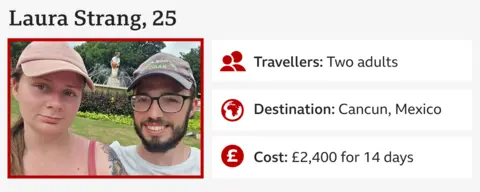
Laura Strang, 25, from Oban saves money by booking at the last minute.
She even booked her honeymoon just two days before they flew.
“We got married on the 21st of June and waited until the 23rd of June to book a holiday for June 25th.
“We had two weeks in Mexico because it was cheaper than two weeks in Europe.”
Laura and her husband Sam Gledhill, 27, paid £1,200 each for 14 nights all-inclusive in Cancun.
“I would say we saved thousands of pounds, based on reviews,” she says.
“Ten nights in Spain was coming up the same or more expensive. It’s a 10-hour flight over to Mexico so it’s a little bit crazy, that.”
She says she and her husband have previously booked holidays within a few days of flying to Tenerife, Salou and Marrakesh and have saved money each time.
“Choosing not to go all-inclusive can save money but that depends on the country,” says Laura.
“We found Mexico quite expensive when going out and about [so all-inclusive made sense], but you could probably save money in Spain by going half board.”

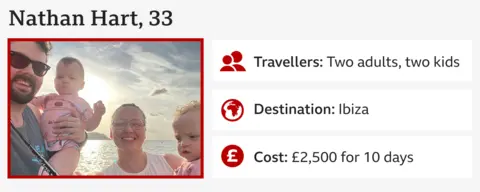
Nathan Hart and his fiancee Cassie Farrelly estimate they saved £3,300 by searching for a holiday that offered a free child’s place and going outside school holidays.
They have booked a 10-day all-inclusive holiday in Spain’s Balearic Islands at the end of September with their three-year-old twin daughters Alba and Luna.
The couple from Merthyr Tydfil recommend using the filter option on some of the biggest travel agency websites.
“When searching you can see which places offer one free child place, choose a range of locations and sort by lowest price,” says Nathan.
“We found an exceptional hotel for £800 per person plus one free child place, so that’s already an £800 saving.
“As well as that, on the booking page you can see a calendar showing the difference in price for the holiday on different dates.”
Nathan says when he compared the same holiday in August it was double the price.
“That would have been completely unaffordable for us.
“I now completely understand why parents with older kids travel inside school term time and it’s absolutely something we will have to consider when our girls are older.”
Parents who take their children out of school for holidays during term time risk being fined, and repeat offenders could face prosecution.


May Burrough works in central London. But her flat is too small to have lots of people to stay, so last October she invited some close friends to a five-bedroomed villa with a pool on the Costa Brava, Spain.
She estimates it would normally have cost around £3,500 to rent a house like that. But she used a home-swapping site and only paid €100 (£85) – for the cleaning fee – plus around £250 on transport.
Although she saved money on the villa, May and her friends did splash out on food and drink, such as oysters and wine from the region.
“We really had a lush time at the house because we were like, ‘well, we’re not paying for the accommodation!'”
Because finding someone to do a straight swap with can often be tricky, the Home Exchange site she uses allows her to earn credits by letting people stay in her one-bedroom flat, and then spend them elsewhere.
“It does take a bit of effort. I put valuables away, you have to change the bedsheets, cleaning every time. But it is fully worth it,” says May.
She says the site is a bit clunky to use, but she loves what it allows her to do, for an annual fee of around £170.
Recently she booked a one-night stay in Vienne, France so she could go to a concert.
“A hotel was going to be mega-expensive. So I booked a room in someone’s home and left in the morning.”


Ebrahim Paruk, 35, from Nuneaton near Coventry in Warwickshire saves money on flights by saving up Virgin Atlantic credit card points.
He does his best to collect as many points as possible.
“I pay for everything I can with the card,” he says, including his bills, weekly petrol, and weekly groceries.
“These are day-to-day necessities that you have to buy, so you might as well get a reward,” he says.
Describing himself as “the biggest football fan you will probably ever find”, he started doing it as a way of going to the major international tournaments.
The best saving he made with the points was a return flight to Düsseldorf to watch Germany v Denmark in the 2024 Euros – he saved £400 on his £800 flight.
To add to the saving, he won the match ticket and hotel accommodation in a competition, meaning the whole trip cost him a total of £500.
Now he uses the same method to save money when booking holidays for him and his wife.


Annmaree Bancroft is a single mum of a three-year-old and has been house sitting with him 11 times.
Their first time was looking after two dogs for a week in a house in Scarsdale outside New York City.
This year they will be going back there for a few days, this time as friends of the homeowner. Then they will stay on for three more weeks in the US, without paying for any overnight accommodation, thanks to further housesitting stints in Connecticut and Brooklyn.
The cost of the holiday will be the £1,435 she is spending on flights, plus travel between cities and spending money.
“A lot of parents think that once you have a child, you can’t travel,” says Annmaree.
“That is just not true. There are these alternative ways now to travel and make it affordable.”
If you do choose to house sit, it is recommended that you use a reputable site. Annmaree uses the online platform Trusted Housesitters, which charges a membership fee for sitters of £99 to £199 a year.


House sitting may also be an option for those choosing not to go abroad.
Kayleigh Pennel-Price lives with her partner, two children, aged two and four months, and their golden retriever Kofi in Wiltshire.
She had looked into a family holiday through the traditional means but calculated that it would cost around £3,000 to go on a foreign holiday for a week.
Instead, the whole family is going house sitting in a small village in Buckinghamshire for two weeks.
They will be staying in a home with a sauna, swimming pool and a private woodland, to look after two Yorkshire terriers, booked through the website HouseSit Match.
“We mostly plan to just stay there,” says Kayleigh, who thinks the whole trip could cost £250.
“We love both abroad and UK holidays, but we don’t like to leave our dog,” she says. “And with the two babies, abroad is a little harder.”
Sinner, 23, and 22-year-old Alcaraz have created a duopoly in the men’s game over the past two seasons.
Because of his brilliance, Sinner has remained the world number one – despite serving a three-month doping ban this year in a case which rocked the sport.
The pair have gained a grip on the Grand Slam tournaments, winning the past six majors between them.
Their epic French Open battle was another demonstration of how the absorbing rivalry – which the ATP Tour has long pinned its hopes on filling the Federer-Nadal-Novak Djokovic void – could be a blockbuster for years to come.
“You cannot compare what the ‘Big Three’ did for 15-plus years. [Our rivalry] is not that big yet,” said three-time Grand Slam champion Sinner, who is aiming for his first non-hard court major.
“This is the second consecutive Grand Slam that we are in the final and playing each other – I believe it’s good for the sport.
“The more rivalries we have from now on, the better it is, because people want to see young player going against each other.”
The quality, excitement and tension of the recent Roland Garros final accelerated interest in the pair.
Alcaraz fighting back from two sets down – and having saved three championship points – to win a five-setter in over five hours has whetted the appetite for Wimbledon.
The five-time major champion expects to be pushed “to the limit” again at the All England Club.
“It’s going to be a great day, a great final. I’m just excited about it,” he said.
“I just hope not to be five and a half hours again. But if I have to, I will.”

 BBC
BBCMakeup and skincare ingredients should be listed in English and not Latin to protect people with allergies, campaigners say.
Cosmetic companies display ingredients in Latin, or using scientific names. But MP Becky Gittins, who has a severe nut allergy, said this was a problem as “less than 5% of our young people are educated in Latin”.
One mum, whose daughter had an allergic reaction to body wash, said cosmetics should be labelled in the same way as food.
Makeup influencer Amy Loring said the labelling system was “frustrating” but for some could be “life threatening”.
The Cosmetic, Toiletry and Perfumery Association (CTPA) said Latin-based names provided a universal language across the globe.
Cosmetic companies list ingredients according to the International Nomenclature of Cosmetic Ingredients (INCI), a system which includes thousands of different Latin-based names.
For example, sweet almond oil is Prunus Amygdalus Dulcis, peanut oil is Arachis Hypogaea, and wheat germ extract is Triticum Vulgare.
Some cosmetic brands also list their ingredients in English, but this is not a requirement.


Eve Huang’s daughter Elysia, 9, is allergic to cow’s milk, coconut, eggs, asparagus, mustard and tree nuts.
Elysia’s allergies are triggered not just by food but by airborne particles and skin contact.
“The Latin puts allergy sufferers at risk and it is so frustrating,” said Ms Huang, from Hornchurch in Essex.
“Why are allergens not listed in bold? Why are there no warning signs?”
Ms Huang said she recently bought Elysia a new skin-sensitive body wash. Within seconds of getting into the bath, Elysia became red and developed a hives rash all over her body.
At first, they did not realise the cause was the body wash.
Elysia did not develop anaphylaxis – a severe and life-threatening allergic reaction – but she did need to be treated.
“A child should not have to take medicine simply for having a bath. A process of getting oneself clean should not make them seriously ill,” said Ms Huang.
She said birthday parties could also be “a nightmare”.
“At one party, Elysia was gifted a facial mask in the party bag and I’ve had to explain she can’t use it until I’ve ‘Googled’ the Latin names and checked whether it’s safe.”
She added: “Some brands now include English translations, which is useful. But I would like to see similar, if not the same standards, as food packaging.”

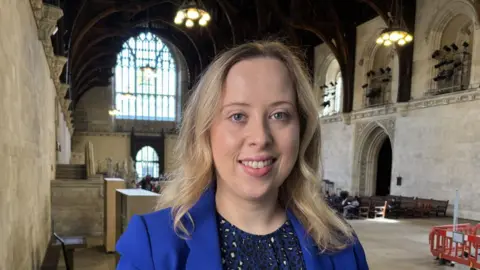
Gittins, the Labour MP for Clwyd East who is behind the campaign for change, has a severe nut allergy. If she were to use products containing nuts it could trigger anaphylaxis.
Gittins said at a recent trip to a spa, she had to frantically “Google” Latin terms to check for allergens.
“Even on a day that’s supposed to be relaxing, I was still mitigating risk. It is incredibly difficult,” she said.
“Less than 5% of our young people are educated in Latin at any level. Even fewer would recognise these terms when checking the back of a packet to see if they can use certain toiletries or ointments – that then becomes a big problem.”
Gittins said her allergy meant she lived with “a base level of anxiety”.
She added: “Do I live a very restricted life, or do I go out and do the things that are more risky?
“That is what we need to minimise – we need to make sure we have a much more allergy-friendly world so we can mitigate that risk.”


Amy Loring, a makeup artist from Cardiff who uses her Instagram page to provide skincare and cosmetics advice to thousands, said the labelling system needed to be “very clear”.
“I have hypersensitive skin and it’s very uncomfortable when you’re breaking out and have eczema over your face. There are some days I can’t put anything on my skin because it is reacting so bad,” said the 31-year-old.
“It is frustrating as a consumer when you get reactions like rosacea, redness, breakouts, and that’s just mild allergies – it can be quite severe and life-threatening.”
Regulations state that cosmetic ingredients must be listed clearly. If there is no outer packaging, the labelling will be on the container. If the product is very small, the ingredients may be listed on a leaflet.
While the INCI system ensures consistency across the globe, critics say it leaves many consumers in the dark.

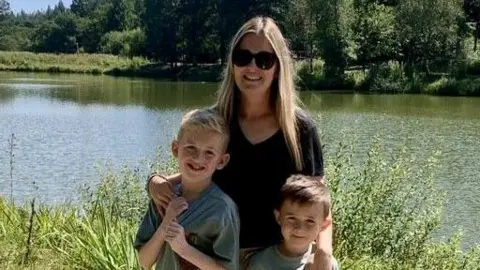 Rachel Williams
Rachel WilliamsRachel Williams’ son, Jacob, is allergic to peanuts, hazelnuts and almonds.
“It is difficult enough to navigate life with allergies without adding the learning of Latin on top of everything else,” said Rachel, from Swansea.
“I can’t always remember the name of certain nuts in Latin, or I doubt myself when I’m checking products. This means I have to search online every time I use a product. I would have a lot more confidence in the products if they stated all of the top 14 allergens in English.”
The CTPA has defended the use of INCI ingredient names.
Caroline Rainsford, the director of science at the CTPA, said the system provided a universal language across the globe.
“For botanical or natural extracts, we refer to the Linnaean system, which is the international system for scientifically naming plants and animals, and lots of those names will be Latin-based,” she said.
“The reason we refer to that system is to have global harmonisation.
“I can see that perhaps people would think it may be easier to have the English name but if you are on holiday and you are looking at the ingredients list, you would need to know the name of the plant in whichever country you’re in.
“Whereas if we use the INCI system, you then just need to remember that one INCI name.
“The more consistency and harmonisation we have with the ingredient list is not only great for us when we’re buying a product, it also makes life easier for companies.”
The industry has developed tools to help consumers navigate the terminology.
One such tool is the COSMILE app, which allows users to search ingredient names by scanning the label.
The app aims to offer reliable and scientifically supported information on thousands of ingredients used in cosmetic products.
A UK government spokesperson said: “Our regulations require all cosmetics to include a full list of ingredients that is clearly marked on the product label or packaging using generally accepted names.”
Kidnapped and held captive in a secret underground bunker by a notorious serial killer.
In the late 1990s, the quiet of a small Russian town was shattered when Irina Ganyushkina stumbled into a police station—an escapee from a living nightmare.
Irina revealed to authorities that she was one of five women kidnapped and held captive in a secret underground bunker by a notorious serial killer: Aleksandr Komin, chillingly nicknamed ‘the maniac.’
For Irina and the other survivors, freedom was only the beginning. In a country where women’s stories of violence are too often dismissed, they now faced a new challenge: rebuilding their lives after unimaginable horror.
In this episode:
-Dariana Gryaznova, human rights lawyer